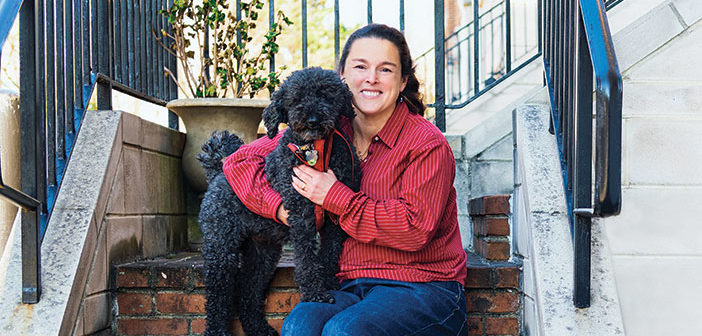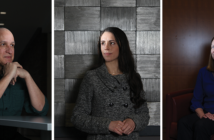The chief medical officer for the Office of Inspector General (OIG) for the US Department of Health and Human Services has a long title, and wears many hats. She oversees monitoring agreements with struggling health care facilities. She shuts down pill mills and dirty doctors who are hurting Medicare and Medicaid programs and patients. She lends her medical expertise during pandemics and other emergencies. She tours migrant children’s shelters to make sure they’re safe.
It’s a job that requires clinical and scientific know-how, a keen legal eye, and a sprinkling of diplomacy. Good thing Julie Taitsman ’92 MD’96, JD, has it all.
“We’re oversight for 100 different programs,” Taitsman says in a phone interview, rattling off a partial list of her responsibilities: Head Start, the Indian Health Service, the Office of Refugee Resettlement, even the 2014 Ebola outbreak.
“A lot of people would hate that. They come to work one day and have no idea what they’re going to be working on, having to learn about a new disease or learning about a new program. But I like that,” she says. “That’s just my personality.”
Taitsman, who lives in Bethesda, MD, with her husband, 9-year-old son, and poodle-Labrador mix, credits the Program in Liberal Medical Education (PLME) for her attraction to such a wide-ranging job description.
“That was the real appeal of Brown for me, that you could do a liberal arts major,” says Taitsman, who studied diplomacy and foreign policy as an undergrad and, as a a fourth-year med student, began law school at Harvard. “The things that I use on a daily basis … come from unexpected places,” she adds, like applying her math skills to create a guide to statistical sampling, or drawing on her clinical training in her oversight role.
People’s lives hang in the balance in the OIG’s decisions. When federal agents collared a Michigan physician who was prescribing unnecessary chemotherapy and defrauding Medicare, OIG helped his cancer patients find new, legitimate doctors. They try to work with troubled hospitals and nursing homes to improve, Taitsman says, to avoid “the drastic impact of shutting them down.”
Taitsman contrasts her work with that of her sister, Lisa Taitsman ’90 MD’94, MPH, an orthopedic trauma surgeon in Seattle. “She sees a patient who comes in from a bear mauling or a helicopter crash, and a bone sticking out. She puts it back together, and she directly sees that what she did fixed them,” Julie Taitsman says. Whereas the OIG’s impact is more indirect: if she sees something wrong when touring a facility, she says, “I tell someone who tells someone who tells someone to fix it. And we try to promote policies and procedures to make sure the problem doesn’t happen again.”
“Julie is so humble about her accomplishments and her responsibilities,” Lisa Taitsman, who is also a professor of orthopedics at the University of Washington, writes in an email. “While I have the privilege of helping a few people on what often is the worst day of their lives, Julie impacts millions every day.”
Much of Julie Taitsman’s work relates to Medicare and Medicaid, by far the largest programs in her portfolio. She distinguishes between waste, fraud, and abuse: “Good people commit waste,” she says, “but waste is something education can really help with.” That’s another one of her hats: speaking at national conferences to teach providers to prevent wasteful and fraudulent spending.
“I often tell people that my sister works ‘for the enemy,’” Lisa Taitsman jokes. “The reality is that Julie has a very important job and plays a vital role in managing health care and the ethical/legal practice of physicians. Her office really goes after the true outliers. … I am actually very thankful that someone as smart and as thoughtful as my sister is the medical director of OIG/HHS.”




